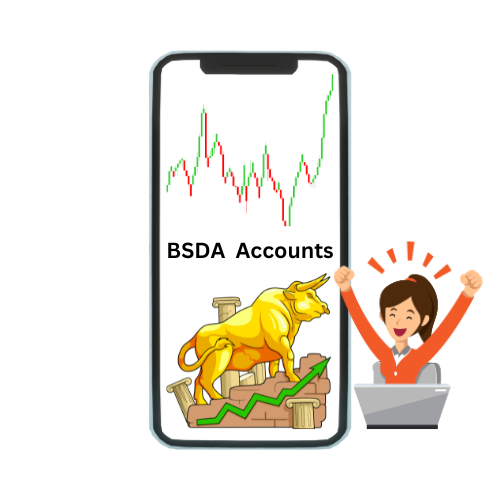Basic service Demat Account limit has been raised to ₹10 lakh from the current ₹2 lakh by SEBI. This move is aimed at increasing retail investor participation in the stock market by making it easier and more affordable for individuals to hold and trade in securities.
What is Basic Service Demat Account?

A Basic Service Demat Account (BSDA) is a type of dematerialized (Demat) account designed to encourage small retail investors to participate in the securities market by offering them a more cost-effective way to hold and trade shares. Here are some key features and benefits of a BSDA:
Key Features of BSDA:
- Lower Maintenance Charges: BSDAs have lower maintenance charges compared to regular Demat accounts. If the value of securities held in the account is below a certain threshold, the account holder enjoys reduced or even zero annual maintenance charges.
- Account Value Limits: Initially, the limit for holding securities in a BSDA was ₹2 lakh. However, SEBI has recently increased this limit to ₹10 lakh. This means investors can hold securities worth up to ₹10 lakh in their BSDA without incurring higher maintenance costs.
- Simplified Documentation: Opening a BSDA typically involves simpler documentation and processes, making it more accessible to a larger number of investors.
- Reduced Transaction Charges: Besides lower maintenance fees, transaction charges for buying and selling securities may also be lower for BSDAs, which further reduces the cost burden on small investors.
Benefits of BSDA:
- Cost-Effective: The primary advantage of a BSDA is its cost-effectiveness, making it an attractive option for small investors who may not trade frequently or hold large portfolios.
- Promotes Financial Inclusion: By offering lower fees and simplified processes, BSDAs make it easier for a broader segment of the population to invest in the stock market, promoting financial inclusion.
- Increased Market Participation: By reducing the cost barriers to entry, BSDAs encourage more retail investors to participate in the securities market, leading to a more diversified and resilient market.
- Flexibility: Investors can convert a BSDA to a regular Demat account if their investment portfolio exceeds the specified limit, providing flexibility as their investment needs grow.
Eligibility Criteria for BSDA:
- The account holder must be an individual.
- The account holder can only have one BSDA across all Depository Participants (DPs).
- The account value (total value of securities held) must not exceed the specified limit, which is now ₹10 lakh.
How BSDA is Different from Regular Demat Account
A Basic Service Demat Account (BSDA) and a regular Demat account both serve the primary function of holding securities in electronic form, but they differ in terms of costs, features, and eligibility criteria. Here are the key differences:
Feature | BSDA | Regular Demat Account |
Annual Maintenance Charges | Lower or zero | Standard, can be higher |
Account Value Limit | Up to ₹10 lakh | No limit |
Eligibility | Only individuals, one BSDA | Individuals and entities, multiple accounts |
Service Charges | Lower | Standard, can be higher |
Account Conversion | Required if holdings > ₹10 lakh | Not applicable |
Statement Frequency | Annual/Half-yearly (if no transactions) | Monthly/Quarterly |
Opening Process and Documentation | Simplified | Standard, more extensive |
SEBI has increased BSDA Account Limit from 2 lakhs to 10 Lakhs
- The new guidelines will come into force from September 1st Increasing the limit of securities’ value held in the Basic Services Demat Account (BSDA) will encourage small investors to trade in the stock market and ensure their financial inclusion.
- A basic service Demat account, or BSDA, is a more basic version of a regular Demat account. The facility was introduced by markets regulator SEBI in 2012 to reduce the burden of Demat charges on investors with small portfolios.
- On eligibility for BSDA, SEBI said an individual is eligible for a BSDA if he/she meets certain criteria such as the investor has only one Demat account as the sole or first holder, has only one BSDA in his name across all depositories and the value of securities in the account does not exceed ₹10 lakh for both debt and non-debt securities combined at any time.
- Before this, an individual was allowed to hold debt securities worth up to ₹2 lakh and other than debt securities worth up to ₹2 lakh in a single Demat account to be eligible for BSDA.
- For portfolio values up to ₹4 lakh, SEBI said that the annual maintenance charge for a BDSA would be nil and for portfolio values of above ₹4 lakh and up to ₹10 lakh, the charges would be ₹
- However, if portfolio value exceeds ₹10 lakh then BDSA should automatically be converted into a regular Demat account. With regards to services for BDSA, the regulator said that electronic statements would be provided free of cost to such account holders, besides, physical statements can be charged at ₹25 per statement.
- As per the circular, Depository Participants (DPs) will open only BSDA for eligible accounts unless the account holder opts for a regular Demat account via email.
- DPs must review and convert existing eligible Demat accounts to BSDA within two months unless the account holder opts to keep their regular Demat account via email. This review will continue at the end of each billing cycle. Earlier this month, SEBI came out with a consultation paper on enhancing the threshold limit for BSDA.
Impact of Limit Increase in BSDA Account by SEBI
The increase in the limit for Basic Services Demat Accounts (BSDA) from ₹2 lakh to ₹10 lakh by SEBI is expected to have several significant impacts on the stock market and the broader economy. Here are some key potential impacts:
- Enhanced Retail Participation:
The increased limit makes it more attractive for small and medium-sized investors to participate in the equity markets. This can lead to a surge in the number of retail investors. A larger and more diverse investor base can contribute to market stability and reduce the dominance of institutional investors.
- Increased Market Liquidity:
With more investors able to hold larger portfolios without incurring high maintenance costs, trading volumes are likely to increase, enhancing market liquidity. Higher liquidity can lead to better price discovery, making the market more efficient.
- Financial Inclusion:
The move promotes financial inclusion by making it easier and more affordable for a wider section of the population to access and invest in capital markets. By reducing the cost barriers, more people might be encouraged to save and invest in securities rather than relying solely on traditional savings methods.
- Growth in Equity Culture:
As more individuals enter the market, there may be an increased demand for investor education and financial literacy programs. A higher limit in BSDA can promote a long-term investment culture, as investors can hold larger portfolios and potentially benefit from long-term capital appreciation.
- Impact on Brokers and Depository Participants:
Brokers and depository participants (DPs) may see growth in their client base as more individuals open BSDAs to take advantage of the higher limit. Although BSDAs have lower maintenance charges, the increase in the number of accounts and transactions can offset this through higher overall transaction volumes.
- Regulatory and Operational Impacts:
SEBI and other regulatory bodies may need to enhance their monitoring and oversight mechanisms to manage the increased number of accounts and ensure compliance. DPs and brokerage firms may need to adjust their operational processes to accommodate the expected influx of new BSDA accounts.
- Economic Implications:
Increased retail participation can contribute to greater capital formation in the economy, as more funds are channelled into productive investments. A more vibrant and inclusive stock market can support economic growth by providing businesses with the capital needed for expansion and innovation.
Conclusion
The increase in the limit for BSDA accounts is a strategic move by SEBI to democratize access to the stock market, promote financial inclusion, and foster a culture of investment among small and medium-sized investors. By lowering cost barriers and enhancing the benefits of holding a Demat account, SEBI aims to create a more robust and inclusive financial ecosystem. This change is expected to have a positive ripple effect across the market and economy, contributing to greater liquidity, improved price discovery, and long-term economic growth.





